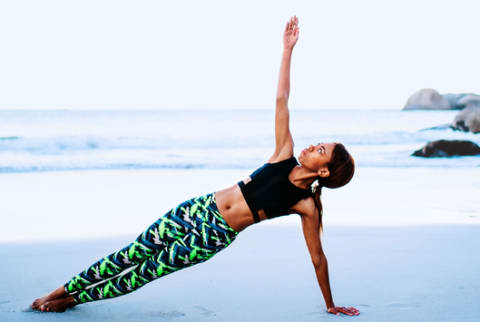Advertisement


The role exercise plays in disease prevention1 has been studied for decades, but new research surrounding physical fitness and breast cancer risk saw particularly interesting results. According to a study conducted out of Colorado State University, Memorial Sloan Kettering Cancer Center in New York, and the University of Michigan, female rats with low levels of physical fitness are four times more likely to develop breast cancer when exposed to a known breast cancer trigger than those who were physically fit.
Here's something to keep in mind, though, other than the fact that rats are not humans: Researchers were specifically testing for genetic physical fitness or how fit these rats were naturally regardless of how much they exercised. So if physical fitness is mostly genetic, is there a point in exercising more in the name of breast cancer prevention? Here's what the experts have to say.
Protective genes are helpful, but they're not the only means for cancer prevention.
According to Laura Bourdeanu, Ph.D., R.N., and V.P. of OncoGambit, the idea that physical fitness is genetic isn't new. In fact, research shows that our inborn fitness accounts for about 50 percent of differences in improvement in aerobic capacity. But if you don't have this gene, should you give up all hope? Bourdeanu doesn't think so.
"It is certainly an interesting study, as its findings inform us of the protective effects of the gene associated with higher aerobic capacity against breast cancer," she explains. "It is important to mention that this protective effect was higher in the presence of calorie restriction and running, and these findings in no way minimize the protective effects of diet and exercise in those who do not possess the gene. People should not get discouraged by these findings and stop eating healthy or exercising. This is just a component that accounts for cancer prevention and not the only or the most important one."

Here's how you should move if you want to prevent cancer.
When it comes to breast cancer prevention, are all exercise forms created equal? Bourdeanu typically recommends a combination of aerobic exercise and strength training. "I recommend patients aim for at least 150 minutes of moderate physical activity daily, like brisk walking and slow swimming, each week to reduce their cancer risk," she says. "Once they are conditioned, they can increase the intensity and time of exercise, since studies suggest there is dose-response relationship between exercise and breast cancer risk."
What this means? People will see a greater prevention benefit with a higher frequency and duration of activity. The more exercise, the better—and don't forget to work your muscles. "I also recommend weight training twice a week to increase lean muscle mass," says Bourdeanu. "Studies show that weight training is associated with decreased cancer risk2."
Exercise, specifically yoga, is also crucial when it comes to cancer recovery.
While cardio is king when it comes to prevention, Lisa Merkle—a devoted yogi and wellness enthusiast who was diagnosed with colon cancer—said yoga was key to her recovery.
"I'm not an expert, just a human being having a very human experience," she warns. "But I can tell you that yoga played a big role throughout my treatment and my recovery. I knew instinctively that I needed to calm my nervous system, and yoga was the most efficient way for me."
She adds that while she was going through chemotherapy, she lost a lot of tone—and yoga and Pilates helped with that. "They were the most accessible form of gentle weight training. I was given physical restrictions after my two surgeries, specifically nothing that engaged my core. I committed to building up endurance and strength by spending time being active in nature: beach walks and moderate hikes. Post-cancer care, prevention of reoccurrence looks a lot like a preventive lifestyle that includes daily exercise. Whatever gets you turned on, blood circulating, fresh oxygen in your lungs, maintaining flexibility."
Want to know more about the connection between exercise and cancer? Read more about the yogi who got cancer and read up on how she recovered.

These 6 Simple Steps Will Make The Age Of Aquarius Your Best Era Yet
Perpetua Neo, DClinPsy

These 6 Simple Steps Will Make The Age Of Aquarius Your Best Era Yet
Perpetua Neo, DClinPsy

These 6 Simple Steps Will Make The Age Of Aquarius Your Best Era Yet
Perpetua Neo, DClinPsy

These 6 Simple Steps Will Make The Age Of Aquarius Your Best Era Yet
Perpetua Neo, DClinPsy









